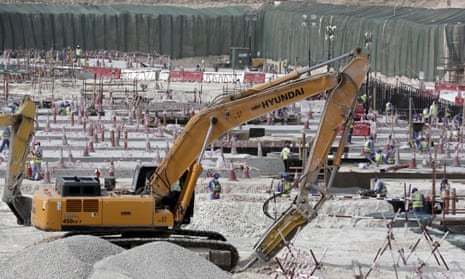A law change that will allow the majority of migrant workers to leave Qatar without permission from their employers has been heralded by campaigners as a landmark in the battle against labour abuses in the build-up to the next World Cup.
Qatar has faced international scrutiny over the working conditions facing hundreds of thousands of migrants toiling on construction sites in the prelude to the 2022 tournament.
But Sharan Burrow, general secretary of the International Trade Union Confederation, said the changes would “take the heart out of the kafala system”, a notorious form of sponsorship that binds workers to their employer.
Under the new law, employers will no longer have the power to deny exit permits to most of their workers, though they will retain this right for 5% of their workforce.
The changes will not affect the rights of workers who are not covered by Qatar’s labour law, such as the country’s 174,000 domestic workers. Research by Amnesty International has found domestic workers are especially vulnerable, face long working hours, severe restrictions on freedom of movement and physical and sexual abuse.
Houtan Homayounpour, head of the International Labour Organization project office in Qatar, said the law was a “first step towards full suppression of exit permits”.
There are more than 1.9 million migrant workers in Qatar – about 90% of the country’s total population, according to the ministry of development planning and statistics. Most are from south and south-east Asian countries including India, Nepal, Pakistan, the Philippines and Bangladesh.
Reports of appalling working conditions have placed Qatar under intense pressure to improve migrant worker rights. In 2013, a Guardian investigation found evidence of forced labour for migrants working on Qatar’s World Cup infrastructure projects.
Workers alleged that they had not been paid for months, that they had been denied access to free drinking water in the desert heat, and that passports were routinely confiscated. During the summer of 2013, Nepalese workers died at a rate of almost one a day in Qatar, many of them young men who had sudden heart attacks.
James Lynch, an independent researcher specialising in Qatar and migrant rights, said the changes to residency law marked an important milestone, but called for wider reforms that include all workers.
“At present, the law essentially says that you are bound to your employer for the rest of your contract, which can run for up to five years,” said Lynch.
Workers who leave their jobs without employers’ permission can be reported for “absconding”, and could face arrest and deportation.
“[The new law] certainly removes a tool for employers, but what you see in other Gulf states is that employers will confiscate passports, so the next step has to be reforming laws on passport confiscation,” Lynch added.
Qatari law allows companies to hold an employee’s passport, provided they have written consent.
Burrow said the 5% allowance for employers was an interim measure, and that further regulations would be announced regarding workers who fall outside the labour code.
The reforms are a “step towards fundamental rights for migrant workers,” she added. “The kafala system was built around the fact that workers had to be sponsored, but they were effectively owned by another human being: their employer. Their visa was dependent on it, their identity card, their right to be in the country. It was modern-day slavery by any name.”
“Qatar’s World Cup legacy can be the transformation of its labour system from one that drives exploitation to one that provides an example for the region,” said Stephen Cockburn, deputy director of the global issues programme at Amnesty International. “There remains a huge amount to do, and fully abolishing the exit permit should be one step among many in achieving that.”
